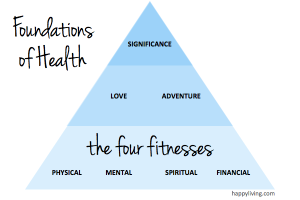The Key Principles of a Healthy Living Foundation

What is a Healthy Living Foundation?
Definition and Importance
A Healthy Living Foundation serves as a blueprint for achieving a balanced and fulfilling lifestyle. It represents the core principles that support overall well-being, which includes not just physical health but mental and emotional wellness as well. Adopting a healthy living foundation is crucial because it lays the groundwork for combating chronic diseases, enhancing longevity, and improving life quality. For instance, consider someone who has switched to a healthier lifestyle. They not only feel more energetic but also find joy in activities they once avoided. This transformation emphasizes the foundation’s role in not just surviving, but thriving!
- The Key Principles of a Healthy Living Foundation
- What is a Healthy Living Foundation?
- Definition and Importance
- Components of a Healthy Living Foundation
- Nutrition for a Healthy Living Foundation
- Importance of Healthy Eating
- Key Nutrients for Optimal Health
- Physical Activity and Exercise
- Benefits of Regular Exercise
- Types of Physical Activities for Health
- Rest and Sleep
- Importance of Adequate Rest
- Tips for Better Sleep
- Stress Management
- Understanding Stress and Its Effects
- Techniques for Managing Stress
- Hydration and Its Impact on Health
- Importance of Staying Hydrated
- Signs of Dehydration to Look Out For
- Building Healthy Relationships
- Social Connections for Overall Well-being
- Communication Skills for Positive Interactions
- Mental Health and Emotional Well-being
- Strategies for Maintaining Mental Wellness
- Seeking Professional Help When Needed
Components of a Healthy Living Foundation
A robust healthy living foundation is multifaceted, encompassing several key components:
- Nutrition: Eating balanced meals that nourish the body.
- Physical Activity: Engaging in regular exercise to maintain fitness and strength.
- Rest and Sleep: Ensuring adequate sleep to rejuvenate the body and mind.
- Stress Management: Utilizing techniques to control stress levels effectively.
- Hydration: Drinking enough water to keep the body functioning optimally.
- Social Connections: Building healthy relationships that provide emotional support.
- Mental Health: Fostering a positive mindset and seeking help when necessary.
Each of these components interplays to create a harmonious lifestyle that promotes health and happiness.
Nutrition for a Healthy Living Foundation
Importance of Healthy Eating
Transitioning into sustainable health practices inevitably brings us to the hallmark of a solid healthy living foundation: nutrition. Healthy eating is pivotal as it fuels our bodies, influences our moods, and maintains vibrant energy levels. Imagine starting your day with a sugary breakfast versus a nutrient-rich meal; the latter not only provides sustained energy but also keeps your mind sharper throughout the day. As someone who once relied on quick, unhealthy meals, the shift to whole foods made a significant difference in my daily energy and mental clarity. Healthy eating goes beyond weight management; it’s about nourishing the body to feel alive and balanced.
Key Nutrients for Optimal Health
To maximize health benefits, one must pay attention to essential nutrients, including:
- Carbohydrates: Choose whole grains for energy.
- Proteins: Incorporate lean meats, legumes, and nuts for muscle repair.
- Fats: Focus on healthy fats from avocados and olive oil for heart health.
- Vitamins and Minerals: Fruits and vegetables are vital for immune function and overall wellness.
Incorporating these nutrients into everyday meals not only enriches the body but fosters a holistic approach to health, paving the way for a dynamic lifestyle.
Physical Activity and Exercise
Benefits of Regular Exercise
As we delve into the realm of physical activity, it’s crucial to understand the staggering benefits of regular exercise. Exercise does more than just tone muscles; it rejuvenates the mind and bolsters emotional resilience. For instance, when incorporating workouts into my routine, I noticed that not only did my energy levels soar, but my mood stabilized, too—an unexpected bonus! Regular physical activity brings a wealth of advantages:
- Boosts Physical Health: Reduces risks of chronic illnesses, such as heart disease and diabetes.
- Enhances Mental Clarity: Improves cognitive function and may help stave off memory loss.
- Elevates Mood: Releases endorphins, helping combat stress and anxiety.
- Improves Sleep Quality: Promotes deeper, more restorative sleep patterns.
Types of Physical Activities for Health
There’s a multitude of ways to incorporate physical activity into daily life, catering to individual preferences:
- Aerobic Exercise: Running, swimming, or cycling boosts cardiovascular fitness.
- Strength Training: Lifting weights or resistance bands helps build muscle mass.
- Flexibility Exercises: Yoga or stretching enhances overall mobility and reduces injury risk.
- Recreational Sports: Engaging in basketball, soccer, or dancing makes exercise enjoyable.
By embracing a variety of physical activities, individuals can find joy in their fitness journeys while reaping the myriad benefits of staying active.
Rest and Sleep
Importance of Adequate Rest
Moving from the vibrant world of physical activity, we arrive at a cornerstone of a healthy living foundation: rest and sleep. Adequate rest is more than a luxury; it’s essential for overall health and wellness. Personally, I’ve experienced times when I skimped on sleep, only to find my productivity plummet and my mood take a nosedive. The benefits of a good night’s sleep are profound:
- Physical Recovery: Sleep aids in muscle repair and recovery after exercise.
- Mental Clarity: A well-rested mind is sharper and more focused, aiding decision-making.
- Emotional Stability: Sufficient rest contributes to a more balanced mood and reduced anxiety.
- Immune Function: Adequate sleep strengthens the immune system, helping fend off illnesses.
Tips for Better Sleep
Enhancing sleep quality doesn’t have to be complicated. Here are some simple tips that have helped me achieve deeper, more restful nights:
- Create a Sleep Schedule: Try to go to bed and wake up at the same time each day.
- Limit Screen Time: Reduce exposure to screens at least an hour before bed to allow your mind to unwind.
- Establish a Relaxing Routine: Engage in calming activities like reading or meditation.
- Optimize Your Sleep Environment: Keep your bedroom cool, dark, and quiet for optimal conditions.
By prioritizing rest and incorporating these strategies into daily life, individuals can significantly improve their overall well-being and maintain the energy necessary to thrive.
Stress Management
Understanding Stress and Its Effects
As we transition from the importance of rest and sleep, it’s vital to address a common hurdle in our journey to a healthy living foundation: stress. Understanding stress and its effects is imperative because it influences both mental and physical health in profound ways. I remember a period in my life when stress felt overwhelming; my sleep suffered, emotions fluctuated, and productivity dwindled. Stress can be classified into two types:
- Acute Stress: Short-term stress that can be beneficial, like meeting a deadline.
- Chronic Stress: Long-term stress that can lead to serious health issues such as anxiety, depression, or heart disease.
The effects of unchecked stress include:
- Physical Symptoms: Headaches, fatigue, and muscle tension.
- Mental Impacts: Impaired focus and decision-making.
Techniques for Managing Stress
To navigate stress effectively, it’s crucial to have strategies in place. Here are some techniques that have worked for me:
- Mindfulness Meditation: Practice being present to alleviate racing thoughts.
- Physical Activity: Engage in a workout—exercise is a natural stress reliever.
- Deep Breathing Exercises: Incorporate deep breathing to calm the nervous system.
- Time Management: Break tasks into manageable steps to avoid feeling overwhelmed.
By recognizing stress and employing these techniques, individuals can cultivate a more balanced, resilient approach to life’s challenges.
Hydration and Its Impact on Health
Importance of Staying Hydrated
Continuing our journey toward a healthier lifestyle, let’s explore the vital role of hydration. Staying hydrated is often overlooked but is essential for optimal health. I’ve personally noticed that on days when I intentionally drink enough water, my energy levels are higher, and my focus sharpens significantly. The importance of hydration can’t be overstated:
- Regulates Body Temperature: Helps maintain a stable temperature during physical activity.
- Supports Nutrient Transportation: Water facilitates the movement of nutrients in the body.
- Boosts Skin Health: Proper hydration results in a more vibrant complexion and can even reduce signs of aging.
- Enhances Digestion: Ample water intake aids digestion and prevents constipation.
Signs of Dehydration to Look Out For
Recognizing the signs of dehydration is crucial to maintaining health. Here are some common indicators to be mindful of:
- Thirst: An initial sign that the body needs more fluids.
- Dry Mouth: A lack of moisture can be one of the first symptoms.
- Fatigue: Low energy levels may signal dehydration.
- Dark Urine: If urine is dark yellow rather than pale straw, it often indicates insufficient hydration.
By paying attention to hydration and incorporating these practices, individuals can significantly enhance their overall health and well-being.
Building Healthy Relationships
Social Connections for Overall Well-being
Transitioning from hydration, we arrive at a crucial aspect of a healthy living foundation—building healthy relationships. Social connections profoundly impact overall well-being, contributing to emotional stability and happiness. I’ve observed that when I nurture friendships and engage with family regularly, my mood lifts and my stress levels decrease. The benefits of strong social connections include:
- Emotional Support: Friends and family provide a safety net during tough times.
- Increased Longevity: Research shows that individuals with strong social ties live longer.
- Enhanced Mental Health: Positive relationships can reduce feelings of loneliness and anxiety.
- Opportunities for Growth: Engaging with diverse perspectives can broaden one’s mindset.
Communication Skills for Positive Interactions
To cultivate these meaningful relationships, effective communication is key. Here are some essential skills to foster positive interactions:
- Active Listening: Show genuine interest by listening attentively and responding appropriately.
- Empathy: Understand and validate the feelings of others, which strengthens connections.
- Expressing Gratitude: Regularly acknowledge and appreciate the people in your life.
- Clear Expression: Communicate thoughts and feelings openly but respectfully.
By actively nurturing social connections and honing communication skills, individuals can create a supportive network that enhances their overall quality of life.
Mental Health and Emotional Well-being
Strategies for Maintaining Mental Wellness
As we delve into the realm of mental health and emotional well-being, it’s essential to understand that maintaining mental wellness is a proactive endeavor. I’ve found that integrating small, positive habits into my daily routine significantly bolsters my mental state. Here are some effective strategies to consider:
- Practice Mindfulness: Engage in mindfulness exercises or meditation to cultivate a present-focused mindset.
- Stay Physically Active: Regular exercise releases endorphins, which help elevate mood and reduce stress.
- Connect with Nature: Spend time outdoors to rejuvenate your mind and find peace.
- Establish a Routine: Create structure in your day to foster a sense of stability and predictability.
Seeking Professional Help When Needed
While self-care practices are beneficial, there may come a time when professional help is necessary. It’s vital to recognize that seeking support is a strength, not a weakness. Signs that it might be time to consult a professional include:
- Persistent Feelings of Sadness: If sadness lingers and interferes with daily life.
- Difficulty Coping: Struggling to manage emotions or recent life changes.
- Social Withdrawal: Isolating from loved ones can indicate deeper mental health concerns.
By prioritizing mental wellness and being open to seeking professional help, individuals can maintain emotional resilience and lead fulfilling lives.



